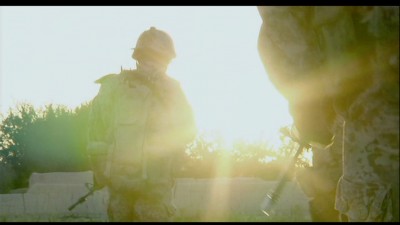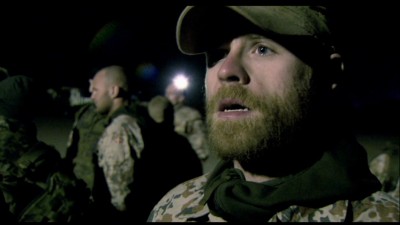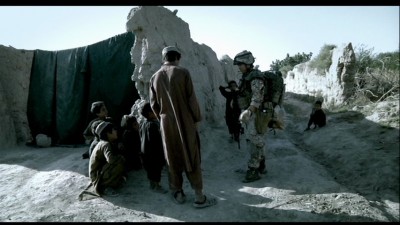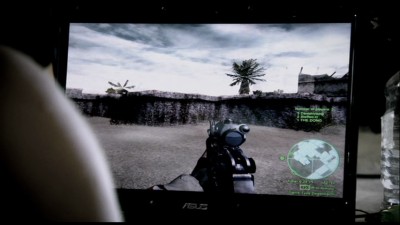| Reviews & Columns |
|
Reviews DVD TV on DVD Blu-ray 4K UHD International DVDs In Theaters Reviews by Studio Video Games Features Collector Series DVDs Easter Egg Database Interviews DVD Talk Radio Feature Articles Columns Anime Talk DVD Savant Horror DVDs The M.O.D. Squad Art House HD Talk Silent DVD
|
DVD Talk Forum |
|
|
| Resources |
|
DVD Price Search Customer Service #'s RCE Info Links |
|
Columns
|
|
|
Armadillo

I don't know if my starry-eyed, naive outsider's view of Scandinavia as a pacifist-socialist paradise can take much more. First there was that horrendous Anders Breivik incident (which even managed to drag in poor Lars von Trier, himself a challenge to anyone's idea of Scandinavians as innately and uniformly well-adjusted), and now there's Armadillo, a film by von Trier's fellow Dane Janus Metz, which documents the war in Afghanistan from the Danish point of view and demonstrates that there is a universality to the deadly and loyalist codes of behavior and "honor" in the military mindset that reaches even to forces representing a nation like Denmark (which is, shall we say, less ready and eager to deploy their armies than we are). On the cinematic level, too, Armadillo gave the lie to my Euro-cinephilia; as far as his Danish cineaste compatriots go, Metz is more wishy-washy, wannabe-important Susanne Bier (In A Better World) than prickly, perfectionistic Lars von Trier, and his having one foot in the cineplex and the other in the arthouse renders Armadillo a rather mixed, unsatisfying bag.

The film's subject is a group of Danish soldiers--part of the special "Horse Cavalry" regiment that had previously assisted in the Kosovo intervention--who are deployed to Afghanistan for six months in 2009 to pitch in with the post-9/11, U.S.-led war against the Taliban. The unit seems to consist of a couple dozen soldiers, but the film hones in on a smaller handful who seem, together, to exemplify the experience of living (along with other regiments of their British counterparts) in the Armadillo operating base in rural Afghanistan. The film is divided into sections by month, with copious footage of the soldiers in their day-to-day activities, which primarily seem to involve grunt work, waiting, drills, more waiting, watching porn, and generally being bored and frustrated about not getting to see battle and griping--sometimes playfully, sometimes in earnest--about that state of affairs. This is vital, because it probably most accurately represents the bulk of what this kind of soldier's life is like during a tour of duty, and the nitty-gritty also provides much-needed context for the more "glamorous" action that comes later in their stay.

After some of the Danish men are killed in one of their intermittent, almost desultory engagements and exchanges of fire with the Taliban, a retaliatory ambush is planned, resulting in some of that "real" action the soldiers have been missing out on, including up-close combat with, and the killing of, several Taliban. This is a triumph for the men involved that is only slightly tainted by word getting spread back home (by unknown members of the team who are castigated as disloyal by the commander in a scolding, "you know who you are" speech) about the potentially scandalous exuberance, gloating, flippancy, and generally undignified and inhumane behavior on the part of the returning soldiers in those adrenaline-filled moments after they first arrived back at Armadillo to report on their killing of the enemy--a celebration that we have seen footage of, and that most of the company looks to be participating in as the disturbing blow-by-blow of the slaughter is recounted in grinning detail by the pumped-up victors.
Although Armadillo represents a laudable attempt on Metz's part to just show us what the soldiers are going through, and despite his offering us the context of the boredom, frustration, and acting-out behaviors of a soldier's life, he does not quite have what it takes to lift Armadillo entirely free of the dubious territory in which a film glamorizes and aestheticizes the brutality and horror of war. Which is not to say that he doesn't have a spectacular array of cinematic technique at his expert disposal; it's just that restraint and astuteness, the qualities that can channel technical mastery into a really effective creative tool allowing the artist to effectively shape the material, are attributes that Metz has yet to completely get a handle on. Thus, whereas a documentary like Anthony Wonke and Ben Anderson's Battle for Marjah--a film that tells (the American version of) the same story--seems plainer, it is also less distracting and more engaging and revealing, perhaps because it was made by a journalist. Metz studied cinema, and if Armadillo is any indication, his real ambition is to make somewhat glossy fictional narrative features. Though, like Marjah, Armadillo was shot using an array of digital video formats (ranging from high-def DV to what appear to be the video recording features of the soldiers' cell phones), the lighting, shooting, and--most noticeably--editing style Metz, cinematographer Lars Skree, and editor Per Kirkegaard have opted for looks like it has been designed to mimic Children of Men (a film I love, but one that does not purport to document actual, living people and their experiences). An additional misstep is Uno Helmersson's way overused score, whether in battle scenes (where the subliminal bass-level pounding gives only the sense of a trailer for a coming-attraction popcorn movie, not of real lives in jeopardy) or adding unnecessary (or unwarranted) extra gravity to dramatic/emotional moments.

When we can look past the film's too-frequently overdone, overemphatic, and lacquered-on style--and there are moments where this occurs, when Metz and Skree give us a reprieve, let up on the effects, and just show us the events with as much fidelity as possible, as when the soldiers who have just shot and killed several Taliban are pulling their dead enemies out of a ditch, or in the multiple moments wherein the Danish soldiers are beseeched and rebuked by the Afghanis living around Armadillo, who care as little for the Western forces as they do for the oppressive Taliban and tell them point blank that they should go home and stop disrupting the agricultural infrastructure upon which their livelihood depends--what we see are worthwhile, informative, even thought-provoking examples of what a war (a current war, one we are still fighting) looks and feels like as it is waged. But the film's focus is too off and on, its contrived beauty and portentousness ultimately harming its effectiveness. There is a great instant--perhaps the sharpest in the film--where we cut sharply, from one scene with the young men playing field-battle-based video games in order to pass the time to another in which actual bombs are exploding in their vicinity, and we can't immediately tell the difference. The implication is that such distinctions might be troubling and dangerous to lose, and it is a strong moment. But when it comes to making that kind of critique, Armadillo doesn't have much of a leg to stand on; the soldiers (and we) may live in a world where essential distinctions between "virtual" reality (TV, movies, video games) and the actual, flesh-and-blood, life-or-death sort of reality have become blurred beyond the point of decent humaneness, but the film itself exists in an awkward, in-between place where it cannot decide whether it wants to be Hearts and Minds or The Hurt Locker, when the very reason for and circumstances of its shooting (this is a war zone, not a set; these are soldiers in harm's way, not actors) should have made more conscientious aesthetic choices fairly obvious.
THE DVD:
Aside from whether or not the film's look (often saturated and brightly lit) is best fitted to its content, it has some remarkable visual qualities that make the DV-to-DVD transition quite well, as is often the case with digital formats. The filmmakers have used a variety of digital cameras with varying aesthetic properties and degrees of quality, but the transfer itself is quite good, and the film looks as it was intended to. The gritty, grainy quality of the images (in some of the darker/nighttime scenes, for example) appears to be from the source, not from compression artifacting or any other flaw in the actual anamorphic-widescreen, 2.35:1 aspect ratio transfer
Sound:As mentioned, the sound is actually too spectacular for the movie's good, but with either of the film's soundtrack options (Dolby Digital 2.0 or, especially, the Dolby Digital 5.1) the sound really does shine, speaking on strictly audiophilic terms. The soundtrack is pumped up with layers and layers of sound, including lots of deep, rumbling music and explosions that make the most of all those channels of audio, with no distortion or any other glitches or deficiencies to speak of.
Extras:Just the (fairly well put together and accurately representative) theatrical trailer for Armadillo and a few other trailers for Kino Lorber releases.
FINAL THOUGHTS:In Armadillo, there is an evident, fine impulse to reveal what life in Afghanistan is like for a soldier as a messy, complicated war (what war isn't?) plays out there, as well as a good deal of cinematic ambition and know-how on the part of director Janus Metz. But the sort of nuance and attention to detail Metz clearly knows so well--the technical variety--doesn't always do justice to what he's trying to show us, and sometimes his reliance on the film's important-sounding, overwrought score, pretty/cool-looking visuals, and slick editing overwhelms and undermines the sense that what is happening onscreen has any more weight or consequence than fiction. Metz is thoughtful enough, and certainly has enough vision, to make Armadillo an experience worth having, however compromised. But if his choice of projects in the future more closely matches the direction he is obviously more inclined toward, his next effort will be the sort of dramatic fiction that his sensibility, judging from Armadillo's particular pluses and minuses, is better suited to. Rent It.
|
| Popular Reviews |
| Sponsored Links |
|
|
| Sponsored Links |
|
|
| Release List | Reviews | Shop | Newsletter | Forum | DVD Giveaways | Blu-Ray | Advertise |
|
Copyright 2024 DVDTalk.com All Rights Reserved. Legal Info, Privacy Policy, Terms of Use,
Manage Preferences,
Your Privacy Choices | |||||||













